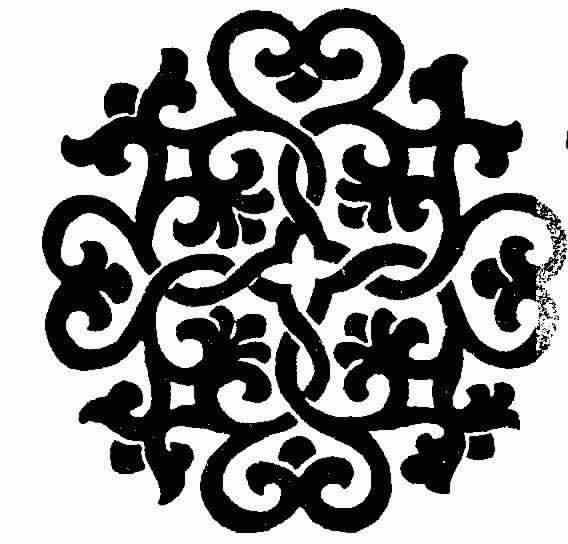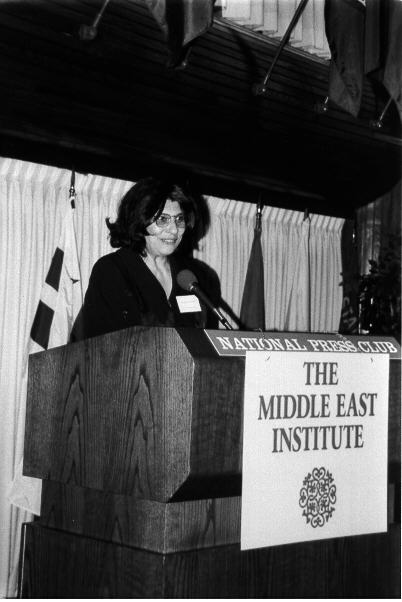 The Middle East Institute
The Middle East Institute
N
E W S L E T T E R
Volume 48,
Number 6
Middle East lnstitute Annual Conference
The Middle East into the 21st Century
On
October 3-4 at the National Press Club in Washington, DC, MEI
held its 51st Annual Conference. The keynote speaker was H.R.H. Prince
Moulay Hisham Benabdallah of Morocco, the
grandson of the late king Mohammed V, and nephew of His Majesty Hassan
11, the King of Morocco. Prince Moulay Hisham discussed the many challenges
facing the Middle East on the verge of the 21st century. In his view, these
regional problems require global solutions. He mentioned the Israeli Palestinian
peace process as the "threshold problem" of the Middle East, as it blocks
progress on other issues.
The
conference's first panel focused on "Islam and Society." William B. Quandt,
who holds the Byrd Chair in Government and Foreign Affairs at the University
of Virginia, discussed the present situation in Algeria. He described the
situation there as especially opaque, because there are no longer two sides
that can negotiate peace. The Armed Islamic Group, for example, is no longer
responsive to a central Islamist authority. Quandt rejected theories about
the Algerian government's complicity in the violence, but he noted that
the regime can be faulted for failing to protect its citizens. Ending on
a positive note, Quandt cited both the Islamic Salvation Front cease-fire
offer and the recent elections as possible signs of progress.


The second speaker
was Fadwa EI Guindi, Adjunct Professor of Anthropology at the University
of Southern California and president of the newly formed Middle East section
of the American Anthropological Association. She focused on Islam as a
frame of reference in the daily lives of the majority of Egyptians and
warned against the tendency to see Islam only as a political movement.
She discussed how political events in the Middle East have strengthened
a revival of Islamic values since the late 1970s. For ordinary Muslim Egyptian
men and women, Islam has inspired not militancy, but silent resistance.
Islamic Identity and Resistance
National Press Club
Friday, October 3, 1997


Projecting Points
 On
October 3, 1997, Fadwa El Guindi, Adjunct Professor of Anthropology at
the U of Southern California and Research Anthropologist at El Nil Research,
Los Angeles, spoke at the National Press Club on the social and cultural
aspects of Islam and,the Islamic movement in Egypt. The audience comprised
Mi ' ddle East experts, diplomats, students and scholars of the Middle
East, as well as the media and press. The presentation was sponsored by
the Middle East Institute in Washington, DC, which held its 5 1 st Annual
Conference on October 3-4. The theme of the conference was "The Middle
East into the 2 1 st Century.
On
October 3, 1997, Fadwa El Guindi, Adjunct Professor of Anthropology at
the U of Southern California and Research Anthropologist at El Nil Research,
Los Angeles, spoke at the National Press Club on the social and cultural
aspects of Islam and,the Islamic movement in Egypt. The audience comprised
Mi ' ddle East experts, diplomats, students and scholars of the Middle
East, as well as the media and press. The presentation was sponsored by
the Middle East Institute in Washington, DC, which held its 5 1 st Annual
Conference on October 3-4. The theme of the conference was "The Middle
East into the 2 1 st Century.
The only anthropologist on the panel, El Guindi focused on the anthropological
dimension of Islam and the 'Islamic movement. Using ethnographic observations
in Egypt, she argued that Islam is indeed the most vital frame of reference
in the daily lives of the majority of Egyptians. She stressed the inadequacy
of the perspective held by nonanthropologist experts of the region, which
has overemphasized the political and militant dimensions at the expense
of the cultural and social role of Islam and the meaning of Islamic values
in the.lives of ordinary folk.
El
Guindi warned against the tendency (by US foreign policy experts, in particular)
to see the contemporary Islamic movement out of cultural con-. text and
only as a political and militant movement. Alternatively, El Guindi's anthropological
analysis situates the movement in a dynamic revitalization process.
Processual
phases of the movement began in the early 1970s and continu into the late
1990s as it has spread throughout.most of the Islamic region. It evolved
from a phase of reestablishing cultural identity to the
contemporary phase of resistance
to undemocratic local . regimes, international political and economic pressures,
and regional colonial occupation. She discussed how political events in
the Middle East have strengthened a revival of Islamic values since the
late 1970s. For ordinary Muslim Egyptian men and *wornen, Islam has inspired
not militancy but silent resistance. as, for example, to imposed normalization
with Israel.
Fadwa El Guindi has been speaking
in national and international forums of public and diplomatic audiences
about various aspects of Arab culture *since the 1970s and is a regular
speaker -at the Foreign Service Institute on Arab culture, She is incoming
President of' the newly formed Middle East Section of the AAA and may be
reached at <elguindi@bcf.usc.edu>
http://www-bcf. usc.edu/~elguindi/
 The Middle East Institute
The Middle East Institute The Middle East Institute
The Middle East Institute

